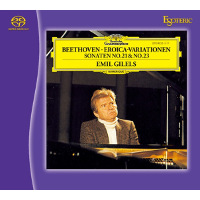|
|
|
Nice review with which I completely agree. Stupendous playing here (esp. Appassionata) and the sound quality in these Gilels DGG recordings was often notably good. I find even those with a very close-up perspective, and sometimes them in particular, hugely enjoyable and thrilling.
My other favorites of the Appassionata on SACD are Beethoven: Piano Sonatas Nos. 23, 12, 22, Piano Concerto No. 1 - Richter, Munch, which, contrary to what Praga claim, is the same as Beethoven: Piano Sonatas No. 17 "Tempest", 18 & 23 "Appassionata" - Richter (which is a pity, since the actual Prague performance promised by Praga here packs a much bigger punch), and, for those able to cast fixed conceptions aside, Beethoven: Piano Sonatas No. 8, 14 & 23 - Glenn Gould.
I'd say I go for those more often than the Gilels one, which for me is a bit like any Mahler symphony: so frightfully powerful that you can only bear its impact on rare, carefully selected occasions.
|
|
|
Post by Claude March 29, 2014 (2 of 21)
|
|
It's strange that they chose the digitally recorded Eroica variations for this SACD. Esoteric also fails to mention that fact.
|
|
|
Post by ramesh March 29, 2014 (3 of 21)
|
|
Polarius T said:
My other favorites of the Appassionata on SACD are Beethoven: Piano Sonatas Nos. 23, 12, 22, Piano Concerto No. 1 - Richter, Munch, which, contrary to what Praga claim, is the same as Beethoven: Piano Sonatas No. 17 "Tempest", 18 & 23 "Appassionata" - Richter (which is a pity, since the actual Prague performance promised by Praga here packs a much bigger punch), and, for those able to cast fixed conceptions aside, Beethoven: Piano Sonatas No. 8, 14 & 23 - Glenn Gould.
I'd say I go for those more often than the Gilels one, which for me is a bit like any Mahler symphony: so frightfully powerful that you can only bear its impact on rare, carefully selected occasions.
Yes, I wondered about the Praga release. I replied to your original post about it some months ago. I don't have Richter's Prague performance on the original CD release so I can't compare.
However, I once had a BMG CD of Richter playing the Pathetique and Appassionata, I think from the early 1960s, but otherwise of unknown provenance. [ I seem to have lost that disc! ] Stupendous performances, with the Pathetique sounding grandiose, a middle period sonata in all but name.
I've reworked my review regarding the Waldstein's middle movement.
|
|
|
Post by nickc March 29, 2014 (4 of 21)
|
|
ramesh said:
Yes, I wondered about the Praga release. I replied to your original post about it some months ago. I don't have Richter's Prague performance on the original CD release so I can't compare.
However, I once had a BMG CD of Richter playing the Pathetique and Appassionata, I think from the early 1960s, but otherwise of unknown provenance. [ I seem to have lost that disc! ] Stupendous performances, with the Pathetique sounding grandiose, a middle period sonata in all but name.
I've reworked my review regarding the Waldstein's middle movement.
Such a shame they didn't include Les Adieux, which is on the original CD I have.
It's an analogue 1974 recording, so much more a candidate for remastering than an early digital horror, as well as a much greater piece!
I have also always wondered if Gilels' speed for the opening movement of the Appassionata was slightly temperate in comparison to others, but speed is not all.
Nick
|
|
|
|
|
|
ramesh said:
I don't have Richter's Prague performance on the original CD release so I can't compare.
However, I once had a BMG CD of Richter playing the Pathetique and Appassionata, I think from the early 1960s, but otherwise of unknown provenance. [ I seem to have lost that disc! ] Stupendous performances, with the Pathetique sounding grandiose, a middle period sonata in all but name.
The Prague live Appassionata is from Nov 1, 1959, and I have it on a Supraphon "Russian Masters" disc SU 4045-2 (it was also part of their "Richter in Prague" set, but sound quality in that one is a lot worse). The BMG disc you had was, I think, precisely those famed Moscow live recordings (BMG licensed lots of stuff from Melodiya and even had their own big Richter Edition). The Appassionata was recorded on June 9, 1960 and the Pathetique on June 4, 1959. (Also available via Japan from Venezia, CDVE 04287, newly remastered from original tapes and with a 1965 Tempest added.)
The performances? That Moscow Appassionata has to be heard to be believed; it's "one of the most thrilling piano performances ever recorded," says Leslie Gerber, and here I really agree with him. It will blow the roof off your house.
|
|
|
|
|
|
|
|
|
nickc said:
Such a shame they didn't include Les Adieux, which is on the original CD I have.
It's an analogue 1974 recording, so much more a candidate for remastering than an early digital horror, as well as a much greater piece!
I have also always wondered if Gilels' speed for the opening movement of the Appassionata was slightly temperate in comparison to others, but speed is not all.
Nick
Yes, that was my question, too. It's a very good Les Adieux that I adore almost as much as his Appassionata.
For me what does it with Gilels at his best is that amazing hard-won iron proficiency of his and the totally unique steely-shiny quality of his piano tone that really works stupendously well with the Appassionata, I think.
|
|
|
Post by ramesh March 29, 2014 (8 of 21)
|
|
nickc said:
I have also always wondered if Gilels' speed for the opening movement of the Appassionata was slightly temperate in comparison to others, but speed is not all.
Yes Nick,
his tempo isn't the quickest-- I recall a recital where Pascal Rogé relatively zipped through it, gabbling some of the textures. Gilels isn't like a galloping racehorse so much as the charge of a more heavily laden warhorse; if anything is a 'warhorse sonata,' this is it. At the steady tempo which Gilels chooses, he gains benefits at the massive final climax of this movement. It would take someone like Richter in his early 1960s performances [ 10'40 in his 1960 studio version vs just over 11 minutes for Gilels ] to produce as much volume and fury in the climax within the framework of a quicker tempo.
Charles Rosen in his 'Beethoven's Piano Sonatas- a short companion' has some pertinent observations as you'd expect. The opening of the allegro has 'a reserved, sober and almost dry sonority […] which renders the arpeggio and forte that follow more effective, and makes the fortissimo counterstatement of the theme all the more astonishing. The sobriety is consonant with the extraordinarily lean texture of this first page, with a monophonic opening, and a large proportion of silence.'
It would seem that 'large proportions of silence' and 'lean sonorities' do not imply a helter-skelter pace.
|
|
|
Post by nickc March 29, 2014 (9 of 21)
|
|
ramesh said:
Yes Nick,
his tempo isn't the quickest-- I recall a recital where Pascal Rogé relatively zipped through it, gabbling some of the textures. Gilels isn't like a galloping racehorse so much as the charge of a more heavily laden warhorse; if anything is a 'warhorse sonata,' this is it. At the steady tempo which Gilels chooses, he gains benefits at the massive final climax of this movement. It would take someone like Richter in his early 1960s performances [ 10'40 in his 1960 studio version vs just over 11 minutes for Gilels ] to produce as much volume and fury in the climax within the framework of a quicker tempo.
Warhorse? Yes a Bugatti Veyron of pianists: unlimited power and seemingly effortless sovereign control.
BTW I also pulled out my Kempff, recorded at the spry age of 70, 9'56" for the first movement!
N
|
|
|
Post by ramesh March 29, 2014 (10 of 21)
|
|
nickc said:
Warhorse? Yes a Bugatti Veyron of pianists: unlimited power and seemingly effortless sovereign control.
BTW I also pulled out my Kempff, recorded at the spry age of 70, 9'56" for the first movement!
In terms of deploying metaphors for the Appassionata, it's hard to go more Grand Guignol than Kempff himself, who apparently described the close of the sonata as 'under the thunder of sforzati the structure of the universe breaks up. Lucifer, once the light bearer, falls from heaven into darkness.'
So there!
|
|

